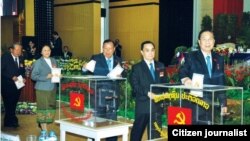ບົດລາຍງານ ການສະລຸບພິເສດ ກ່ຽວກັບສິດທິມະນຸດ ໃນສປປ ລາວ ປີ 2015 ມີດັ່ງນີ້:
ປະເທດສາທາລະນະລັດ ປະຊາທິປະໄຕ ປະຊາຊົນລາວ ແມ່ນໄດ້ຖືກປົກຄອງໂດຍ ພັກປະຊາຊົນປະຕິວັດລາວ ຫຼື LPRP ທີ່ຖືກຕ້ອງຕາມລັດຖະທຳມະນູູນ ພຽງພັກດຽວ ເທົ່ານັ້ນ. ການເລືອກຕັ້ງສະມາຊິກສະພາແຫ່ງຊາດ ຄັ້ງຫຼ້າສຸດ ເມື່ອປີ 2011 ນັ້ນ ແມ່ນ ບໍ່ມີຄວາມເສລີພາບ ແລະ ບໍ່ມີຄວາມເປັນທຳ. ພັກປະຊາຊົນປະຕິວັດລາວ ໄດ້ຄັດເລືອກ ເອົາຜູ້ສະໝັກທັງໝົດ ແລະ ການປ່ອນບັດເລືອກຕັ້ງ ແມ່ນຈຳເປັນຕ້ອງໄດ້ເຮັດ ສຳລັບ ພົນລະເມືອງທັງໝົດ. ບັນດາເຈົ້າໜ້າທີ່ພົນລະເຮືອນ ໃຫ້ຮັກສາການຄວບຄຸມ ກອງກຳລັງ ຮັກສາຄວາມປອດໄພ ຢ່າງມີປະສິດທິພາບ.
ບັນຫາເລື້ອງສິດທິມະນຸດທີ່ສຳຄັນຍັງສືບຕໍ່ເປັນບັນຫາ ຊຶ່ງລັດຖະບານ ປະຕິເສດບໍ່ໃຫ້ ປະຊາຊົນ ມີສິດເລືອກເອົາລັດຖະບານເພື່ອເປັນຕົວແທນຂອງພວກເຂົາ ດັ່ງປະສົງ.
ບັນຫາສິດທິມະນຸດອື່ນໆ ຍັງຄົງສືບຕໍ່ຢູ່ ຊຶ່ງຮວມທັງ: ສະພາບການທຳຮ້າຍຮ່າງກາຍ ຂອງ ພວກຖືກຂັງ ແລະສະພາບແວດລ້ອມ ຢູ່ໃນຂຸກ, ການຂາດແຄນຂະບວນການຍຸດຕິທຳ, ຊຶ່ງຮວມມີການຈັບກຸມຕາມອຳເພີໃຈ ແລະ ການຄຸມຂັງ; ລັດຖະບານແຊກແຊງ ໃນສິດ ເສລີພາບໃນການອອກຄວາມຄິດເຫັນ, ສື່ຂ່າວ, ການເຕົ້າໂຮມຊຸມນຸມ ແລະ ການຄົບຫາ ສະມາຄົມ ພ້ອມກັນກັບ ສິດທິຄວາມເປັນສ່ວນຕົວ; ລັດຖະບານຈຳກັດສິດເສລີພາບ ກ່ຽວ ກັບການສຶກສາ; ການຈຳກັດສິດເສລີພາບ ທາງດ້ານສາສະໜາໃນທ້ອງຖິ່ນ; ການຄ້າ ມະນຸດ; ການຈຳແນກໃນໝູ່ໃນສັງຄົມ ບົນພື້ນຖານຂອງເພດ ແລະ ຕໍ່ບຸກຄົນທີ່ເປັນ HIV/AID; ແລະ ການຈຳກັດ ສິດທິຂອງພວກຄົນງານ.
ລັດຖະບານ ບໍ່ດຳເນີນການ ຫຼື ລົງໂທດບັນດາເຈົ້າໜ້າທີ່ ຜູ້ທີ່ ໄດ້ລະເມີດກົດໝາຍຕ່າງໆ ແລະ ພວກຕຳຫຼວດ ແລະ ກຳລັງຮັກສາຄວາມປອດໄພ ປະຕິບັດໜ້າທີ່ ໂດຍປາດສະຈາກ ການຖືກລົງໂທດ.
The Lao People’s Democratic Republic is ruled by its only constitutionally legitimate party, the Lao People’s Revolutionary Party (LPRP). The most recent National Assembly election in 2011 was not free and fair. The LPRP selected all candidates, and voting is mandatory for all citizens. Civilian authorities maintained effective control over the security forces.
The most significant human rights problem continued to be that the government denied citizens the ability to choose their government.
Other human rights problems continued to include: abusive prison conditions; lack of due process, including arbitrary arrest and detention; government infringements on freedoms of speech, press, assembly, and association, as well as on the right to privacy; government restrictions on academic freedom; local restrictions on religious freedom; trafficking in persons; societal discrimination based on sexual orientation and against persons with HIV/AIDS; and restrictions on workers’ rights.
The government neither prosecuted nor punished officials who committed abuses, and police and security forces acted with impunity.





